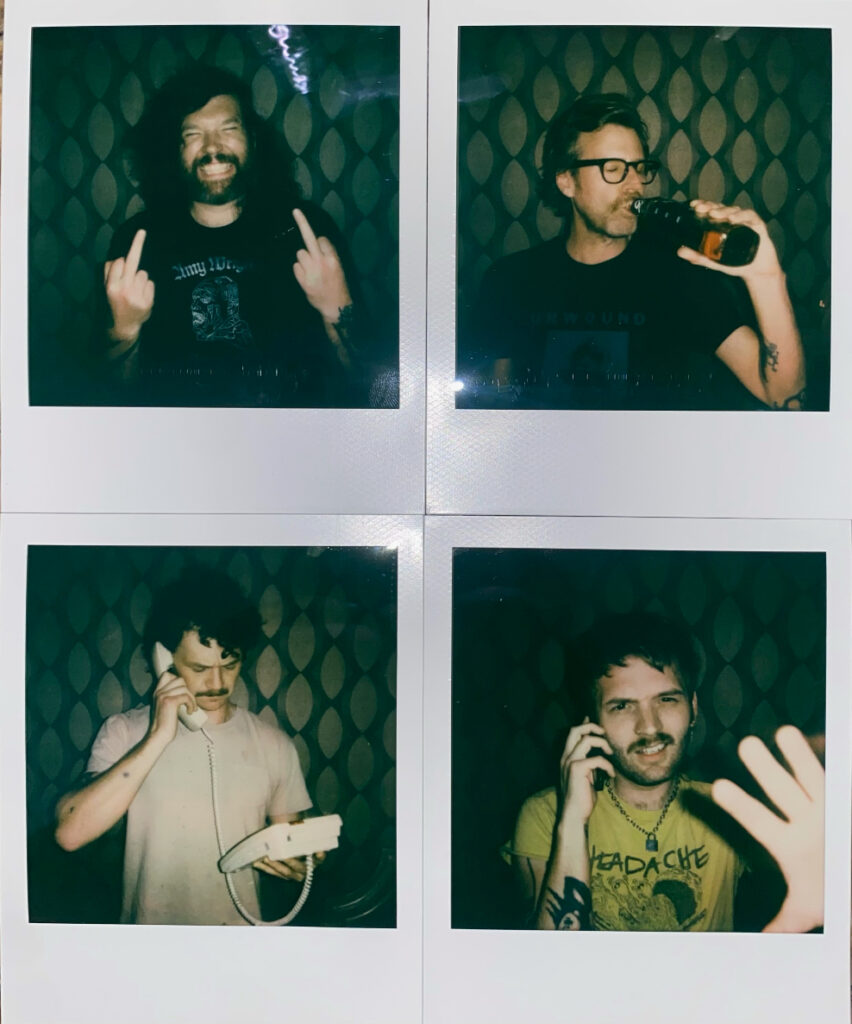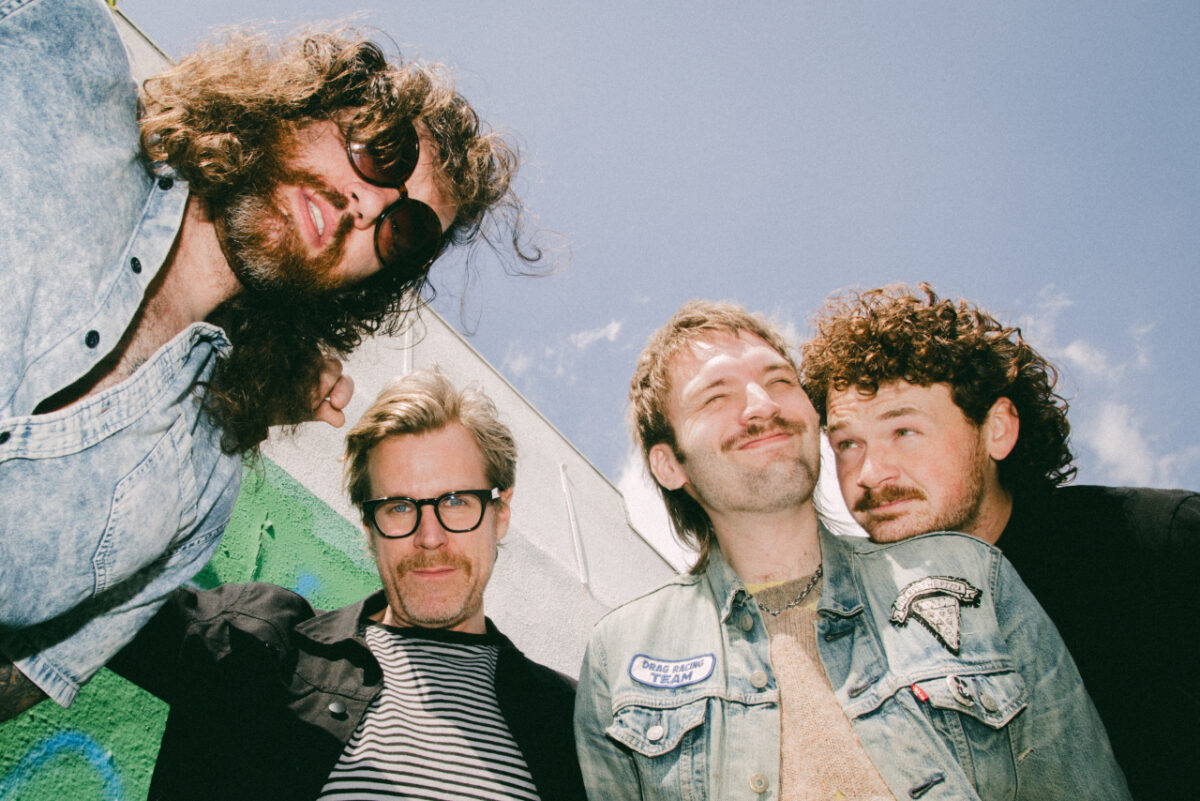“Can we talk about whether or not we want to say on the record how we got our name?” lead guitarist Cormac Brown asks his four-piece band, the noise-punk outfit Molly Horses. “It’s important to note that I have never had a more difficult time doing anything in my entire life than the difficulty we’ve had at reaching a band name,” he confesses.
It’s a fall Tuesday afternoon as we’re gathered around a table in bassist Malcom Watts’ Highland Park backyard, which also serves as their rehearsal space. The four members reach into their pockets as Brown, Watts, Harry James (guitar/vocals), and Tim Wright (drums) pull out their phones to a shared Notes document and start rattling off potential band names.
“I still like ‘industry plant,’” confesses Watts.
“I hate ‘industry plant.’ Won’t do it,” Brown retorts.
“I like ‘Very Good Computer,” admits James.
Brown agrees. “My favorites were ‘Special Movements’ and ‘Clang Clang Clang.’”
“I put ‘Surgery Socks’ after my dad’s surgery,’” recommends Tim. “Because they give you these funny socks with little bumps on the bottom so you don’t slip and fall… it’s fun.”
“But I don’t want too funny,” Brown admits.
Watts continues scrolling, “There’s ‘H.J.’”
Deciding (and agreeing) on a band name is without a doubt the toughest task any band will undergo. It requires a tight balance between contradicting efforts. A name will determine whether you’re given the time of day from someone who’s never heard of you, but at the same time, there’s a strong desire to catch the eye of a potential new fan.
But that especially goes for noise rock bands. Whereas many band names are chosen out of a vacuum, noise rock band names take up a certain kind of history and responsibility that promotes inclusivity.
“I think inclusivity is important in any public facing thing that you’re doing,” Brown declares. “It is weird at that stage of being a band to assume that we have such a platform that it would matter at all. But it’s little microcosms like that that are really important.”
Particularly true in today’s current climate, which makes it hard for any band to make a living from making and playing music.
“It’s not like we practice all the time thinking how we’re going to make money when we make new songs,” Watts professes. “I don’t think we think about that at all.”
“I don’t think anyone in this band feels that way,” Wright proclaims.
“The new success that I’m seeing in L.A.,” Brown continues, “…is you go on tour for a couple months, you play some festivals, and then in your off time you got your three or four bartending shifts a week. And… that’s a fucking dream to me. Everybody talks about ‘making it’ as a musician in this way that they’re talking about something so fucking antiquated, and so not real anymore, especially if you’re a grassroots band and not an industry plant, or an industry project or a pop artist or something like that.”
“Or an influencer,” Wright throws in.
“My favorite hot take that I will not elaborate any further on, is that nobody should ever make money for making art. Ever. Nobody should get paid to make art.”
“Yeah. If you’re doing art for money you shouldn’t do music like we do,” James jokes, and is met with more chuckles from around the table.
“I mean there’s a very visible line in the sand of bands that were at the right time,” Wright enlightens. “I lived in New York from ’99 to ’05, so I saw the birth of everything that we hold in such high regard, like your ‘LCD Soundsystems’ and your ‘Strokes’ and ‘Interpols’ and that stuff… in my opinion, that was the window. If you weren’t elevating yourself and you didn’t get to a certain level by 2005 or 2006, that to me was the cutoff. That sounds like a really long time ago, but even by 2010, it was so fucking hard to get on the road and make any money.”
“What do you think was that divide?” I ask.
“Labels had more money. Advertising budgets were a lot bigger.”
“Was it Napster?” Brown gripes.
“Sure, sure, but also magazines used to be huge. Everyone was going and buying magazines, that’s how people found out about [bands]. And that was a nationwide thing. Like, Wichita would have Uncut, or some cool British magazine that was available, y’know?”
But while being a genre that promotes inclusivity, “noise rock” is also notoriously difficult to pin down as a sound. I run down a quote I had recently stumbled upon somewhere: “[noise rock is] more punk than punk rock, more progressive than progressive rock, more alt than alt rock. Would you agree?”
Wright throws their hands up: “Sure, that’s the empty pot, right? Whatever you want to put in it.”
“Yeah so it’s just music anyway, right?” James concludes. “It’s so hard for me to tell people what we sound like. Because people will ask, ‘what kind of music do you play?’ and I’m like ‘oh, y’know, loud, talky stuff….we’re a four-piece, kind of loud… rock n’ roll… noisy stuff.’”
“But it’s not Tom Petty,” Brown quips.
“It is Tom Petty.”
“…There are elements of Tom Petty,” Brown surrenders. “When we first had a sit down meeting [for Molly Horses], I said, ‘I want every single element of this project to be thought out.’ The intention is to be recorded… there’s not a single note, a single beat that should just be a shrug. It’s like an energy thing for me: this is tapping into an energy and trying to give back to an energy that’s super important to me, and boils down the essence of human-hood and being alive and doing something for the fuck of it.”
All qualities which pretty much embody the noise rock ethos: a genre orchestrated by hard-working, middle-class people who don’t think of their work as anything other than what it is, who get up to do a hard day’s work and check out for the evening.

Bobby Womack plays out their monitor speakers as they set up for a run through of their next show’s set – an unexpected but rather loose choice to get in a headspace – followed by the Carpenters and the Beach Boys.
“Would you like a butthole chair?” James asks me.
“A what?”
“A butthole chair.”
I stare at James blankly when they point to the aluminum stool next to them, the kind that has a hole in the middle of the seat. And as I look around the room, I notice several other stools serving as Molly Horses’ go-to multipurpose tool: one butthole chair holds up the hi-hats, while another holds up a mic stand, another holding their tempo click.
I choose to stand as they assemble the gear: Brown plugs his Jazzmaster into a Fender Hot Rod Deville, James on an identical setup. Wright sets up their 1961 Slingerland drums with an SPD-SX for pads, with Watts on a Fender Jazz bass accompanied by an Erebus modular synthesizer, and enough effects pedals with an LED light show that can rival any synth punk’s eurorack setup.
After a brief brush up of the song’s structure, they break into their single, “King Dudalk.” With compressed guitars, and a 4×10 amp configuration that gives just the right amount of low end, the song sounds as if it was already mixed and mastered, a telling sign of audiophile enthusiasts that put live sound first. Guitar tones get even more chopped and distorted one song after the next as I realize what makes their sound so cinematic: different personalities coming together to create.
“Who do you believe your contemporaries are?” I ask. Molly Horses looks to each other blankly.
“I don’t think we sound like anyone in L.A.,” Wright confesses. “I know that sounds pompous. But my girlfriend nailed it, she said: ‘you are a band that musicians like.”
“And that’s something that people tell us all the time, ‘You guys don’t sound like anybody else,’” James follows.
“We play with Ughh a lot,” Brown mentions. “They’re contemporaries in that they are our peers. And we play a lot with them, we’re pals with them. They’re great. The closest we’ve played with who I thought, ‘Oh this feels in our little pocket’ was Guck.”
“I was talking with my dad about it on the phone,” James clarifies. “And I said, ‘well the problem is everybody in L.A. sounds like the Osees,’ and the Osees live here. So I don’t want to be the ‘budget band’ of the band that lives in the state you live in.”
“I will say that the thing that’s given me the most joy,” Wright contributes, “is getting compliments from other bands we play with who don’t sound anything like us and who you’d think wouldn’t even take the time to listen. We’ve gotten a lot of compliments from bands that I could be like, ‘woah, really? You dug it?’ Someone was reciting lyrics [back to us]. It’s really flattering.”
After a short while, they continue the run down of their upcoming set. They rip into their single ‘Beatty,’ a bass heavy song that leans strong on the upbeat and alternates between a four/four and five/four time signature, all tied together by James’s snarky but howling vocals. As one song bleeds into another, I can’t help but notice a single thread that ties them altogether: “What’s your greatest take away from Steve Albini?”
“Oh God,” Brown trifles, dazes off briefly in thought. “There’s a clarity, and a sort of ego-less, spiritual approach to the way he wanted to create and capture sound, that I think was really beautiful.”
“I think that’s a lot of the way we communicate as a band as well,” Wright adds. “We’re all just allowed to bring to the table what we’re good at. We’re very lucky that these four elements became something really kind of magical. There’s no ego in [Molly Horses]. There’s no bullying of ‘you do it this way, you do it that way.’”
“Just jabs,” Brown prides.
“It’s like little kids squirting guns at each other. We’re very fortunate that the ideas that have happened, a lot of them were spontaneous.”
“Especially the way we’re moving into songwriting now.” James adds, “Someone will play something cool at band practice… then we record whatever and can demo it from there. It’s just a really nice, cathartic way for everyone to write their own parts. No one’s going to go ‘that sucks, don’t do that.’ You can be like ‘we should do this instead.’
“Solutions based stuff,” Brown assures. “But the thing that I loved about Albini [on recording other bands]… is he said, ‘in my later years, I realized it’s unfair to the band, it’s unfair to myself, it’s unfair to the listener of the record to even form an opinion about the band.’ Which I thought was so fucking enlightened, and so transcendent… and so I’m trying to, y’know, approach [music] with a little bit more of that.”
Molly Horses will be playing at Gold Diggers and Zebulon on February 8th and March 11th, respectively. Their debut EP, Clang Clang Clang, will be out this spring.
Featured image by Devin DeRose
